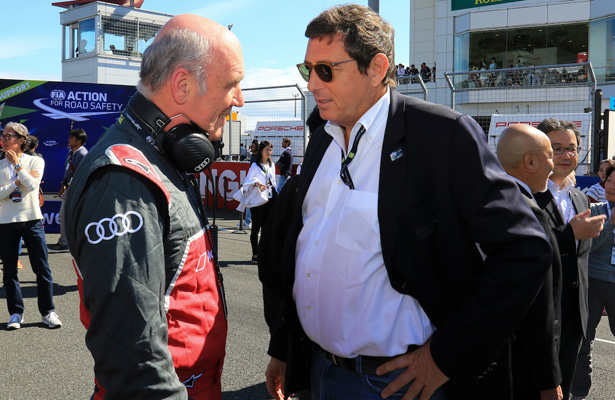
Photo: Vision Sport Agency
FIA World Endurance Championship boss Gerard Neveu and ACO President Pierre Fillon have vowed for the WEC to move on, despite facing a significant loss of a “major player” to the championship in Audi, which announced Wednesday its withdrawal from top-level prototype racing at the end of this season.
Audi’s departure leaves just Toyota and defending World Champions Porsche as the only LMP1 manufacturers in the series next year, which now could see up to five cars in the top prototype class for the season, including at the 24 Hours of Le Mans.
“We understand this decision, although obviously we regret the departure of a major player in the WEC,” Neveu said. “Audi has been involved in endurance racing for 15 years, and more particularly in the first five seasons of the FIA World Endurance Championship.
“Today we spare a thought first for everyone at Audi Sport and at Team Joest… Drivers, engineers, mechanics and team members for whom this news is painful. We offer them our admiration and gratitude for their extraordinary sporting performances in the WEC since 2012.”
Rumors of Audi’s exit began during the recent WEC round in Fuji Speedway, following a report from German publication Auto Motor und Sport, which indicated that the manufacturer was poised to leave at the end of the 2017 season.
However, Audi’s Chairman of the Board of Management Rupert Stadler announced Wednesday that it would forgo next year altogether, ending its 18-year factory involvement at the end of this year.
“Although prepared for this, we regret the departure of a major figure in endurance racing for a different adventure,” Fillon said. “More than a competitor, the marque with the four rings has been a real contributor in recent years to the tremendous growth of endurance racing across the world.”
Fillon said the ACO will continue cost-cutting measures in the top prototype class, with the hope of attracting new manufacturers, although it’s understood none are on the immediate pipeline for the new phase of regulations that are set to debut in 2018.
While Audi’s exit was arguably influenced by VW Group’s “dieselgate” scandal, and the diminishing focus on diesel road car technology, annual LMP1 budgets are said to range from $100-200 million.
“To reduce costs for manufacturers is a major focus for the ACO, in partnership with the FIA,” Fillon said.
“Furthermore, these two organizations have clearly set the course for the coming years: stay at the forefront of innovation while offering the best possible platform for new technologies in preparation for the cars of tomorrow.
“Hybrid technology and electric motors are already part of our daily lives in endurance racing. The changes to the technical regulations towards hydrogen-electric power responds straight away to the energy requirements of this new era.”
Next year will see the WEC return to a two-manufacturer race for the first time since 2013, prior to Porsche’s arrival, although Neveu still feels confident in the overall product.
“The WEC is made up of a grid of 32 cars, 20 teams, with four categories and six manufacturers entered,” he said. “In a week’s time, in Shanghai, Porsche and Toyota will be battling on track for the 2016 LMP1 world title, as Ferrari and Aston Martin will be for the GTE title.
“One manufacturer is leaving, others will soon be arriving. This is the life of a championship.”

























